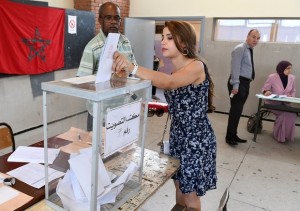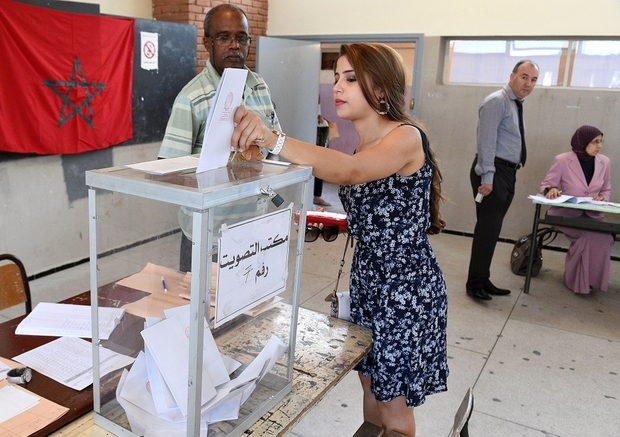Middle East Eye

A Moroccan woman casts her vote in the local elections at a polling station in the centre of the Moroccan capital Rabat on September 4, 2015. Some 15 million Moroccans are heading to the polls for the local elections seen as a gauge of the popularity of the government of Abdelilah Benkirane a year ahead of a general election. AFP PHOTO / FADEL SENNA
During elections on 4 September, the Democratic Left Federation did well in Rabat. What does the future hold for this new political organisation?
RABAT – The Democratic Left Federation (FGD), a coalition of three so-called “radical” left-wing parties in Rabat, came second in the Agdal Riad constituency, a rather affluent district of the Moroccan capital, during the recent communal elections.
Overtaken by the Islamists of the Justice and Development Party (PJD), the FGD nevertheless managed to get nine municipal councillors elected, five women and four men.
However, even combined, these three parties – the Socialist Democratic Vanguard party (PADS), the National Ittihadi Congress Party (CNI) and the Unified Socialist Party (PSU) – have usually put in a weak electoral performance. In the rest of the country, the federation achieved no significant breakthrough, getting barely over 100,000 votes, while 1.5 million people voted for the Islamists of the PJD. In Casablanca the PSU’s general secretary Nabila Mounib failed to win over the electorate.
Nevertheless, this coalition has generated real enthusiasm, particularly among left wing activists and party members. FGD leader Omar Balafrej, who is not a member of any established political party, does not see this as a victory but as a “first step”. His goal is to offer a third option as an alternative to the Authenticity and Modernity Party (PAM) – close to the monarchy and created to counter the Islamists – and the Islamists of the PJD, who have made significant progress in major Moroccan towns and cities. Balafrej’s task will nevertheless be a difficult one, as the left in Morocco is extremely divided and the issues dividing them are significant – including the constitution and the power of the monarch, economic reforms and more. The left is also divided by ideological differences that may be difficult to reconcile.
Boycotting the elections
In recent weeks, the bone of contention has been participation in the election itself. Among activists on the far left, this recurrent subject has generated passionate debate, just as it always has. Within the PSU, part of the party’s youth wing was initially opposed to participating in the election. But above all, elections are boycotted by those who declare themselves as having a left-wing outlook, but who are members of no political party.
The members of the Marxist party Annahj Addimocrati (Democratic Way), which has not taken part in any election since it was created in 1995, once again campaigned for a boycott (their meetings have been banned by the authorities on several occasions). The call for boycott was supported by activists from ATTAC, Maoists and a number of independents.
In their view, the electoral process does not work democratically in Morocco. Among other things, they condemn the buying of votes and stress that there is no guarantee of transparency in the elections organised by Morocco’s Ministry of the Interior.
“There are several dynamics in what we generally refer to as the left,” explained Mohamed Jaite, a member of the Annahj Addimocrati party.
“There is a powerful dynamic launched by the boycott campaign within Annahj. There is also a dynamic launched within the FGD but how is this likely to develop? I have no idea,” Jaite told Middle East Eye.
“The historical experience suggests to me that they are chasing illusions,” he continued. “I believe that the necessary precondition to build a left-wing political force which can achieve something in Morocco is independence from the palace. I feel that the current FGD leadership lacks independence from the monarchy.”
Younes, a former member of the PSU and an activist within the 20 February protest movement, which called for more democracy and respect for the state of law in 2011, has only voted once, in 2007. He has boycotted all elections since then. His view on these elections sums up the viewpoint of many activists. “When I campaigned for the boycott, I felt rather guilty as I saw honest genuine people who thought that they could change things,” he told MEE.
“I don’t agree with them. I believe that they can’t change things from inside. I have faced the facts and we need to be realistic. The same people now participating in the elections boycotted those of 2011. They have weakened the boycott and ultimately have achieved nothing.”
He added: “The election system and the institutions can be seen as a software programmed by the makhzen [the “store,” – an expression used by the Moroccans to refer to the monarchy and its institutions] which is not intended to bring about democracy.”







